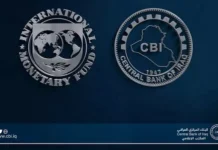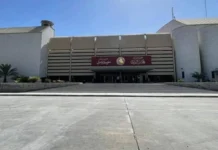Tishwash: Security deployment and closure of the gates of the Green Zone in Baghdad
Press sources reported, today, Thursday, that the gates of the Green Zone in the capital, Baghdad, began closing, after the bombing that targeted the capital.
She said, “The security forces began closing the gates of the Green Zone in the capital, Baghdad, in anticipation of any emergency,” noting, “There is a heavy security deployment within the vicinity of the Green Zone.” link
Tishwash: Iraq considers targeting the PMF headquarters in Baghdad a “terrorist act” and holds the international coalition responsible for the attack
Today, Thursday (January 4, 2024), the spokesman for the Commander-in-Chief of the Armed Forces, Major General Yahya Rasool, described the targeting of the Popular Mobilization Forces headquarters in Baghdad as a “terrorist act,” while holding the international coalition forces responsible for this unjustified attack.
Rasoul said in a statement received by “Baghdad Today”: “In a blatant attack and a blatant violation of Iraq’s sovereignty and security, a drone carried out an act no different from terrorist acts, targeting one of the security headquarters in the capital, Baghdad, today, Thursday, which led to casualties in… This incident is completely unacceptable.”
He added, “The Iraqi Armed Forces hold the International Coalition Forces responsible for this unprovoked attack on an Iraqi security body operating in accordance with the powers granted to it by the Commander-in-Chief of the Armed Forces, which undermines all understandings between the Iraqi Armed Forces and the International Coalition Forces.”
He stressed, “We consider this targeting a dangerous escalation and assault on Iraq, far from the spirit and letter of the mandate and the work for which the international coalition was created in Iraq.”
Earlier today, a security source reported that the death toll from the bombing of the Popular Mobilization Forces headquarters had risen to 8 members, including two martyrs.
The source told “Baghdad Today”, “The initial toll of targeting a headquarters belonging to the Popular Mobilization Forces in the Palestine Street area, east of the capital, Baghdad, rose to 8, including two martyrs.”
While another source spoke to “Baghdad Today”, that “the person targeted in the bombing that targeted one of the headquarters of the Popular Mobilization Forces is Abu Taqwa Al-Saeedi, commander of the 12th Brigade (Najab Movement 1-).”
He added, “There is no truth to the injury of the Secretary-General of the Popular Mobilization Forces, Lieutenant General Abu Muhammed Al-Halafi.” link
************
Tishwash: From the dollar to the dinar… Iraqis complain about the deterioration of their salaries
“I have been waiting for about four months to receive my full salary from the bank, but every time I receive half of it and have to wait two or three weeks until I receive another payment,” says Sakar Mustafa, an Iraqi journalist who works independently with international institutions.
She explains to “ Raise Your Voice ” that “her salary ranges between 1,500 and 2,000 US dollars, depending on the work she performs, but what the bank disburses to her does not exceed 1,000 dollars, which is a very small amount that is not sufficient for all of her monthly expenses, represented by house rent and school tuition.” Bills and transportation.
“I spoke to the bank, and they informed me that they had received instructions to disburse salaries according to their capabilities, and currently they do not have the full liquidity to disburse it in full in dollars,” Mustafa continues.
She confirms that “her salary either arrives incomplete, or is transferred to the Iraqi dinar at the official rate set by the government (1,320 dinars per dollar), at a time when the exchange rate in the parallel market is 1,520 dinars per dollar.”
On December 31, the Central Bank of Iraq announced the identification of the categories that receive their transfers in US dollars, which are: diplomatic missions, all international organizations and agencies operating in Iraq, and non-governmental civil society organizations registered in the General Secretariat of the Council of Ministers, in the event that the foreign donor stipulates that they pay sums of money. Foreign transfers received in the dollar currency inside Iraq.
In addition to government contracts in effect in the US dollar currency, ongoing contracts for grants, loans, and foreign agreements, and 40% of the remittances received by Iraqi exporters resulting from their exports abroad.
Since the end of 2022, Iraq has been witnessing an exchange rate crisis, represented by the fluctuation of dinar prices against the dollar and other foreign currencies, and inflation in the prices of goods and services in local markets.
The crisis deepened in 2023, with a significant decline in the price of the dinar against the dollar in the parallel market.
One of the solutions developed by the government is to force merchants to deal in the Iraqi dinar in their local transactions, so that the Central Bank of Iraq adopted the electronic platform in the currency auction to limit the smuggling of the dollar from the country and increase the value of the dinar.
The Central Bank activated the second phase of adopting the platform, with the aim of subjecting individual financial transfers and credit cards, activating electronic payment, reducing dependence on cash, and allowing Iraqi banks to import all currencies, including the dollar, to meet the needs of their customers.
But these solutions did not end the crisis in salaries for Iraqi employees working with foreign institutions.
“arbitrary action”
From the beginning of last December until the 20th of December, Iraqi banks, both governmental and private, have imported 255 million US dollars to meet the needs of their customers, according to the latest Central Bank statistics, published by the official news agency .
Economist Hammam Al-Shamaa told “Raise Your Voice,” saying, “Reducing the exchange rate in the parallel market to the official exchange rate will not be achieved in the short or even long term. There are many obstacles that prevent this.”
He wonders: “Does Iraq have enough foreign currencies and dollars if oil prices fall? Can it pump into the markets an amount of dollars that would lead to equality or matching between the official and parallel prices?”
“The answers are left to the future,” adds Al-Shamaa, who considered that “the Central Bank’s insistence on dealing with employee salaries paid in dollars based on the official exchange rate is an arbitrary and unfair measure for employees who receive US currency. This measure will not have a significant impact on the markets, as there will be a decline.” In remittances, resort to banking offices or black money transfers.”
Economist Nabil Jabbar Al-Tamimi points out that “there is a defect in the Central Bank’s dealings with external transfers from oil companies and institutions, media institutions, diplomatic bodies and oil companies, as well as other employee beneficiaries, who receive their salaries in dollars, and complain about the large difference between the price of… Official and parallel exchange if their salaries are converted into dinars.”
He told “Raise Your Voice”: “The cases you mentioned are exceptional, and are not an excuse to stop the campaign to end dollarization represented by the excessive use of the dollar in the local market, and the fate of the dollar exchange rate in the end is to stabilize at the official rate or something close to it within months.”
At the same time, Al-Tamimi believes that “the public interest requires acceptance of the state’s decisions, despite their problems.” link





